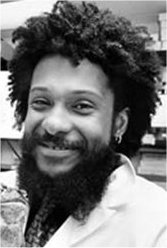| How did you first become interested in biology/science? |
| Childhood curiosity. Tyrone has always been interested in getting outside and seeing what the animals are doing. Geographic magazines and watching the Wild Kingdom on TV every Sunday night at 7:30pm.
|
| Who has inspired you most & why? Any important mentors? |
Tyrone hasn’t been inspired by any one person or any one accomplshiment of another. Tyrone is inspired by his father, who grew up with very little opportunities in life, but managed to instill in Tyrone the need for focus, discipline, consistency, and ambition. Tyrone is also inspired by his kids and wife. His children impress him with their zeal to take advantage of all opportunites, be it sports, academics, trips, etc. His wife’s independent nature impresses him. He maintains a deep respect for the differences in their upbringing and the approach to life, careers, etc that each of them have fine-tuned. Lastly Tyrone has been inspired by Prince, who has managed to cultivate a scandal-free persona from scandal itself. Tyrone has a lot of respect for the artist who was so scandalous at the time, that now, even under public scrutiny, there is no longer any whispers and gasps. Tyrone sees that Prince has decided to take charge of his scandal and scrutiny and own it, turning around the public eye and media chit-chat to work for him rather than against him.
|
| What, would you say, is your most transformative work? What was/is your key discovery? |
Rather than any one moment, Tyrone says his work has taken years to move from understanding why metamorphosis is interesting & complex to asking what controls metomorphosis? What are the underliying endocrine mechanisms influence how and when an organism moves to a different metamorphic stage. He then began to ask how the environment (temperature, water level, population densisty, food availability) affected metamorphic processes and finally coming to the realization that environmental contaminents can have huge effects on the development of amphibian populations. He came to the discovery that something external to the environment, a pesticide, could have the most effect on metamorphosis, an effect greater than any other environmental cue.
This transformed Tyrone’s scientific outlook to realize that he had a professional responsibility to let citizens all over know what his pesticide influence data showed. And in realizing this, Tyrone stated that sometimes the greater weight of your work is not measured in a publication in Science or Nature, but in your work that is accessible to the average public. He smiles as he relays a story to me about how he called his mother, ecstaticly to tell her that he had a paper published in one of the TOP science journals. Days later his mother called to say how she didn’t understand how that journal could be so great if she couldn’t even find it at Barnes & Nobles to buy herself a copy. It was at the moment that Tyrone realized that his Discover magazine and National Geographic articles as well as his speech to Minnesotoan farmers at a local church on Super Bowl Sunday probably held the most weight.
|
| Can you comment on how you think your work has impacted a broader level beyond science? For instance, society, academia as a whole, conservation and/or nature? |
| Tyrone states that his work has probably, on a whole, raised awareness not only on the detrimental uses of pesticide, but also on science’s role in policy. He also states that his work may demonstrate how to positively deal with activists and figure out a way in which one won’t compromise their data & careers. He mentions that is Bioscience article has shown what scientists can do in the realm of politics and academia.
|
| How would you define "diversity" within Science? |
Tyrone defines diversity in science as transcending race and gender to basically include all people of all abilities coming together from different backgrounds. He’s quick to point out that how and where you were raised influences how you approach different topics and questions in science. By harnessing these different viewpoints, you are most likely to get the most out of your scientific research.
|
| What is the biggest hurdle you've faced in your career? How did you overcome it? What hurdles do you see researchers facing today? |
| Tyrone points out that often funding sources are not competitive in many areas outside of the US and parts of Europe. He goes on to say that sometimes the biggest problems facing us are often overlooked because these problems are not found where the biggest money sources are. He points out that one should always understand the context of an argument. For instance, he has met many people who point out the a pesticide free earth will make everyone happy and healthy. But Tyrone knows that when this picture is painted for many African citizens, these people offer a retort saying without pesticides, malaria would wreck havoc on their population. That yes, an earth free of pesticides may lower the chances of cancer, but if you don’t live long enough to develop cancer [because you may succumb to malaria first], the point is rather moot. It is here that you can see Tyrone weighs economical, societal as well as scientific outcomes carefully. He realizes that context, in any argument, is very important.
|
| What advice to you have for young biologists? |
| Tyrone smiles and says, “do what makes you happy!” He goes on to say that he is happy to wake up in the morning and get started on his research. He views his research as a way of life, rather than a job. He says that you should find something to do that makes you excited, passionate and something that you shouldn’t have to take time-off from.
|
|
|


